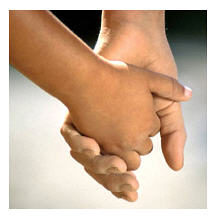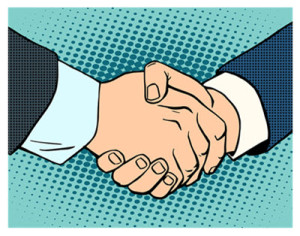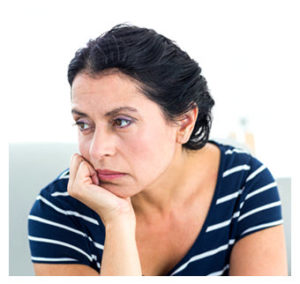A child takes her parent’s hand at the age of two or three, with confidence. She looks up and smiles. She doesn’t doubt; the world assures her that her parent will hold on tightly, and keep her safe.
 But no one stays a child forever.
But no one stays a child forever.
The world is complicated. We learn to move beyond ourselves – to question and to observe; we learn doubt. What we once relied on is crowded out by variations in circumstances and human behaviors that we experience. This is the inevitable consequence of maturing.
Objects break. Accidents happen. Adults are fallible. Motives are often hidden. We find ourselves on the receiving end of a constant flow of impressions and incidents that form us and condition us. We realize how much is out of our control.
Doubt is a special word. We use it in the context of everyday life, in counterbalance to notions of faith, and we recognize it as a potent term when it comes to the American judicial system. “Beyond reasonable doubt” is a phrase of considerable significance.
Doubt, in its variations
So what is reasonable doubt, particularly in our daily experience? Uncertainty is something we expect, we guard against, and we plan for. Certainties are few, though we cannot “doubt it all” any more than we can dispense with doubt altogether.
The free dictionary offers several definitions of doubt:
To be undecided or skeptical about; to tend to disbelieve or distrust; to regard as unlikely; to suspect or fear.
And from these definitions we see doubt’s utility: appropriate distrust in situations where we are wise to be cautious, and even a healthy fear of belief when the outcome we desire is unlikely.
But children and adults both are easily conditioned. When we lose faith in our parents, our siblings, our spouses, our “systems” – doubt becomes a constant presence, and an insidious one. Trust erodes, and our lives narrow.
Doubt on our shoulders
 When the years are tough ones, it becomes hard to believe that good things are possible. At least, that good things are possible for you. It is simpler to doubt their appearance in your daily life, or if they do occur, to doubt their longevity. It’s a matter of self-protection. Conditioning. And emotional survival.
When the years are tough ones, it becomes hard to believe that good things are possible. At least, that good things are possible for you. It is simpler to doubt their appearance in your daily life, or if they do occur, to doubt their longevity. It’s a matter of self-protection. Conditioning. And emotional survival.
It’s about trust – in others, in your judgment, or in that “grand scheme” we may think of as the universe, a confluence of inexplicable forces, or even karma.
Perhaps we fear we’ve angered the gods.
Yet who doesn’t have doubts – about something?
Doubt, self-esteem, belief in the future
Doubt may circle around a core of insecurity wherein we lack confidence in a specific ability or worse – we doubt our worth, or our future. These are common feelings in both men and women, though we’re taught not to admit to them. Sharing our vulnerabilities is relegated to the therapist’s office, or pillow talk, or possibly a few too many cocktails with an old friend.
Success in relationships may restore self-esteem. Success at a job may reinforce belief in abilities. When “life” is going well for a period of time, it can restore what feels like a long spell of bad luck.
I am confident in my abilities. I am confident in my value as a person. But confidence in the future is something that eludes me, where once I thought that my abilities and my belief provided enough control to set the possible paths forward with only the “usual” obstacles and detours to deal with.
Is skepticism a matter of conditioning?
Life has taught me other lessons. Life after divorce, life after layoff, life in a bad economy.
 Life has conditioned me to doubt the future despite all the areas in which I am confident. I am afraid to look too far ahead, afraid to believe that “life” might proceed smoothly, afraid to believe that Murphy and his damnable law aren’t lurking behind the next door.
Life has conditioned me to doubt the future despite all the areas in which I am confident. I am afraid to look too far ahead, afraid to believe that “life” might proceed smoothly, afraid to believe that Murphy and his damnable law aren’t lurking behind the next door.
And things are beginning to improve at the moment. I might venture to say they are going reasonably well, but I don’t dare. So I’ll stick to “things are improving at the moment.”
I know this fear to be tied to a decade of endings, to starting over and over again, though not by choice.
I would like to believe I’ve turned a corner, that I can cast doubt in the gutter, that I can retain the good sense to keep perspective and humility, that by moderating my optimism I can hedge my bets.
If I do not, if it all goes south again, I doubt my strength to pick up the pieces.
Doubt as a life skill?
Doubt is comforting and at times, helpful. But it may be a place to hide. Is it a reasonable way of life?
- Do you doubt your abilities? Your value?
- Do you have doubts in one context and not in others?
- How do you guard against being overly skeptical? Overly optimistic?
- Can doubt and optimism coexist?
- Do you use your awareness of uncertainty to your advantage?
- Is doubt a healthy distrust unless it becomes excessive?
I hear you. Between realism (clear-eyed look at what is true and immutable) and optimism (choosing to view what is real and see an array of possible responses) is my hourly challenge.
I am also fearful and I have my reasons.
One thing about finding you on line is this: I can tell, safely, what might really be going on and 1) be believed and 2) not be seen as that ugly evidence or scary data point that the world is arbitrary about fortune, health, love and so many etceteras.
And, after three years of therapy with the-each-three month check with the self and my therapist: should I take an anti-depressant? No. Each time. I am neutral to positive about medical interventions, including mood stabilizers. But, I was so grateful for my therapist to look carefully with me, to say: Wow. Bad out there for you. Really. But, you seem to keep your sense of self and balance and even a wary-eyed optimism about possibilities. If your functioning and optimism wane, or your body starts to take on the toll, then we will reconfigure….
But, I no longer tell most friends and family members about what is really going on. Not being believed is a kind of false accusation. I can say here and now and loudly: being falsely accused turns out to be worse for me than:
death of a child
loss of another child
divorce
financial worries that are crushing but not bankruptcy-worth (at least now).
Thanks Wolfie. I keep managing doubt, that dark familiar. First, I acknowledge that she speaks the truth. And, that she is a mark of humanity.
Not being believed is a kind of false accusation.
Oh NoName. That’s brilliantly put. I understand perfectly. As I understand the other things you’ve described. The dark familiar, as you say. At least we can operate within it, and keep our own sort of balance, inching along.
And thank you for feeling safe here, and not doubting that you will be believed.
I think I use doubt as a way to lower my expectations, to ease the disappointment (if? when?) it comes. In typing this, it seems that I am in a sad state of affairs, but I’m not sure that’s accurate. I have extremely unrealistic expectations. I use doubt to tame them.
A way to avoid disappointment. Yes, a sort of hedging our bets.
Doubt – I like to think of it as that little voice inside that says “think about this” or “look again” or something is just off…”
And then it starts becoming a bit invasive because it can be the voice that tries to remind us, in a not so great way, that we aren’t perfect. Most damaging is when the doubt dominates our other voices… the voices that are risk taking and dream fulfilling. When doubt is the voice we hear about who we are and what we are worth… I doubted my ability to parent when I never doubted my intellectual ability to succeed. After I became a parent – I wonder if I could do more but I never doubt that I am an awesome parent… or that I can make things happen… but I have other doubts that I have to work through.
That “little voice” sort of doubt seems healthy to me. A healthy skepticism. It’s that tipping point, as you say. When it becomes pervasive. How do you manage that “just right quantity of doubt?”
Here’s what I know. I know that my life is 100 times better than it was 10 years ago. I know that letting go of trusting my X (then-husband) was the right thing to do. I know that the Power of Negative Thinking has paid off for me. I know that there’s much I don’t understand about my life right now, but I’m going with it. I’m not turning down opportunities (in fact, just this week, I accepted one of the most audacious – and suspicious – of such opportunities). I went into it with no expectations and I’m happy to just have had the experience of it. I believe in what has been proven, and appreciate it that much more because so much has proved unworthy of my trust. And I’m happier now than I’ve ever been before.
I think there is doubt, a questioning of what could be, a gentle nudge not to expect everything to be roses and champagne. And then there is DOUBT – the kind of feeling that the world is more bad then good, the feeling that even when things look good that there is something bad hiding under it, the fear of the dark underneath that we cannot see.
I think doubt is healthy and rational and reasonable. I know that DOUBT can be debilitating. But it too has been the rational, reasonable at points.
For me, doubt is useful and comforting. But I know plenty of others – my husband, for one – for whom doubt is limiting, sometimes even crippling. I’m confident, but I like to grip reality firmly – and doubt is there. It’s there more when it comes to matters that are less related to confidence than they are to good fortune, or even something more likely than that but out of my control. Whether it’s doubt, skepticism or cautious optimism, it does help condition me for various possibilities. And in a way, what I think is my own healthy sense of doubt has helped me to lead others to more hopeful place.
There you go again, reading my mind. I was doubting myself for a moment about my “life” because things have been going pretty well and then, boom! Doubt comes creeping in.
I have been reading this book by Eckhart Tolle called the Power of Now. His words emanate what I think is the truth but the voice inside my head says, “Does this guy really know what he’s talking about?”
I’m not sure why this is but every time something positive happens, doubt is lurking. How can you shrug it off? It’s such a pest and it does eat away from my confidence.
I think some of us are conditioned to “expect the worst” (because we’ve had a run of tough things to deal with), so maybe doubt is a way of protecting ourselves from disappointment, as others have said. Then we have to ask – what about the way doubt lessens our enjoyment of good things when they occur?
I agree that a little doubt is healthy. It can protect us from continually putting trust in places we shouldn’t. It keeps the rose-colored glasses from becoming permanently attached to our face. But when, as you say, “we are conditioned to ‘expect the worst,'” that’s when doubt can become a sickness. To let doubt control all thought is equal to sepsis. Always second guessing and expecting the worst can poison a mind. Hope and doubt need to be balanced, with objectivity and faith being in the center.
Well said. For me, doubt simply revolves around the unknown. And to your point about the future (financially, relationally, etc). Doubt and worry are, in my mind, synonymous and not one day has been added to my life worrying about things that are outside of my control.
Taking each day for what it is, being ‘responsible’ about the future but not ‘overly concerned’ as I may not be here tomorrow. I believe in God and that He is pulling the strings, at which point my atheist friends are prepared to point out my idiocy. But these are the very same people, who when things go bad for them, fall back on the old mantra “everything happens for a reason”, and it is at which point I ask “then whose reason?”..there they shut up.
Doubts, fueled by disappointment and unmet expectations, are a part of the human experience. My challenge is always to separate myself, as much as possible, from those and enjoy life for what it brings, pleasant or unpleasant.
Nice to have you stopping by and commenting, ChopperPapa. I hope you will again. Yes – doubts are part of the human experience as you say. But there’s plenty still to enjoy while we’re here.
Excellent post. I must say I’ve never given doubt much thought. I think that little voice of conscience is a doubt of healthy distrust unless it becomes excessive.
I’m sorry I’m only coming around to this post now, but I want you to know that I understand, and I think sometimes we need to just take a leap of faith and live and worry less. It’s never easy, particularly when things have Bern so rocky, but hopefully it will make the days just a bit brighter. You deserve it, you just have to believe you do.
xo
Sorry that I am coming to this conversation late, but your words resonated with me. I don’t see doubt as a negative, but only a way to be prepared for the unexpected. I doubt so that when disappointment happens, the slap in the face doesn’t sting as much.